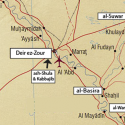Dabiq: The Strategic Messaging of the Islamic State
Aug 15, 2014 - Harleen K Gambhir
The Islamic State of Iraq and al-Sham’s (ISIS) assault on the city of Mosul on June 10, 2014 demonstrated its formidable military strength. ISIS’s activities across Iraq and Syria also reveal that the organization is engaged in governance programs, ranging from Shari’a courts to aid distribution and law enforcement. These efforts underscore ISIS’s desire to erect a functional Caliphate within the boundaries of its controlled territory. That effort requires political and religious control in addition to military victory, and ISIS has a vision for how the Caliphate will form. ISIS has begun to explain its grand strategy to achieve this end through extensive public outreach, including a digital magazine series entitled Dabiq. This backgrounder will examine the contents of the first issue of Dabiq in detail, explaining the significance of this strategic messaging approach by ISIS in conjunction with the announcement of a Caliphate.









